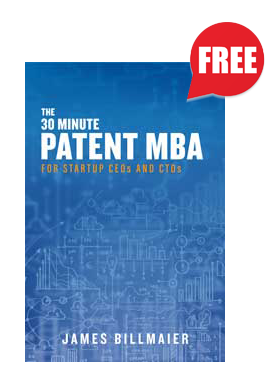This is #2 in our series of chapter excerpts from the book The 30 Minute Patent MBA by Jim Billmaier. Want to get the full ebook for free? Grab it here.
Why Don’t All Startups Patent Their Inventions?
Clearly, there are overwhelming advantages to obtaining patents and trade secrets. Despite this, many startup CEOs and management teams do not make it a priority to protect their businesses’ most vital assets. Here are some of the (mostly bad) reasons we frequently hear:
It is too expensive
This is the most frequent reason given for not pursuing patents, an argument not without merit given that startups are always resource-constrained. Cash is precious, and the company’s existence is often predicated on a CEO’s ability to make those dollars stretch as far as possible. Executive teams are offered the false choice of either developing their product and market or legally protecting their innovations. This is true only because the traditional law firm costs for drafting and prosecuting patent applications do not fit with lean startup budgetary constraints. Many firms still charge via billable hours, shifting the risk onto the client and making it difficult to plan expenses.
Additionally, organizational structures employed by most law firms are bloated and horrendously inefficient—costs that are passed on to the client. Modern, smarter patent approaches leverage technology and deliver patents efficiently while increasing quality. This allows forward-thinking patent professionals to employ affordable, fixed-fee structures, which allow early-stage companies to both develop their product/service AND protect their intellectual property.
We don’t have the time
Time is another resource that is heavily constrained in a startup. Small teams juggle titanic amounts of work, so adding one more item to the to-do list of an already overtaxed engineering team seems like a fool’s errand. In reality, the patenting process should be an integral part of the engineering process. Further, much of the documentation an engineering team already prepares in its regular work process is actually highly useful in preparing a patent application, and having a patent helps to ensure that products developed by the engineering team are not wasted effort.
We thought software isn’t patentable
The court decision in Alice Corp. v CLS Bank led to wild speculation that software might not be patentable. However, successive court decisions have reaffirmed the patentability of software, and computer-related patents continue to be a huge percentage of the patent office’s total volume of work. Your competition understands that software innovation is very patentable.
If we disclose our secret sauce our competitors will just change something minor and copy us
People are sometimes concerned that when a patent application is filed, it will be made public and allow competitors to see what is being done. However, if the application is not going to be filed in multiple countries, an applicant may request that the application remain unpublished until it is granted.
Even if you do wish to file your patent application in countries beyond the United States, a provisional patent application is only published in conjunction with the publishing of a non-provisional patent. This process will provide about two-and-a-half years of complete confidentiality of your filed applications, which is usually long enough to create and then begin marketing your product or service.
I don’t believe in patenting and am philosophically opposed to it
Remember, just because you are a conscientious objector to the patent system doesn’t mean you aren’t a target. Regardless of whether or not a person believes in gravity, a fall from an airplane without a parachute will very likely result in serious injury or death. Further, just because a CEO is philosophically opposed to creating proprietary value does not absolve him or her of the duty to employees and shareholders to protect the company’s assets and value.
We use open source software as the basis for our product
Despite what some people believe, open source and patenting are not mutually exclusive. Many companies that use open source software and build value on top of it create patentable material on top of the publicly shared code. Red Hat, a leading producer of open source software, reportedly has more than 10 issued patents, and 163 pending patent applications in the U.S. alone.
In its “Patent Promise,” Red Hat has stated its opposition to the philosophy of patents, yet acknowledges their necessity in the current system, and pragmatically uses patents as a shield against their competitors.
Patents aren’t valuable because a startup company can’t enforce them
Patents are valuable regardless of the size of the company, and are likely even more valuable to a smaller company. Having strong IP increases the likelihood of success in litigation, and the stronger the likelihood of success, the more likely it is that there will be a respected law firm willing to take the case on a no-upfront-payment success-based model. In fact, there are funds set up that finance the cost of a solid patent case and only collect if the case succeeds.
It is a common misconception that just because you “aren’t doing anything wrong” you won’t be sued. From a defensive perspective, having a patent portfolio gives a startup bargaining chips to play in the event that it is sued for infringement; no portfolio leaves few options and even less leverage.
Our product/service doesn’t contain any patentable inventions
Identification of IP is something that many people struggle with, and we will address that issue in more depth later. But suffice it to say that if you have technology (hardware, software, etc.) that provides competitive advantage, it is likely you have IP. We highly recommend that you use an invention discovery tool or speak to a patent professional to help tease out any valuable IP you may have.
This has been an excerpt from the book The 30 Minute Patent MBA by Jim Billmaier. Used by permission of the author. Want to get the full ebook for free? Grab it here.





